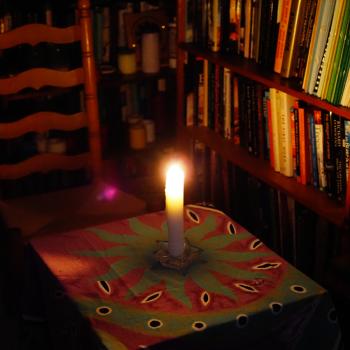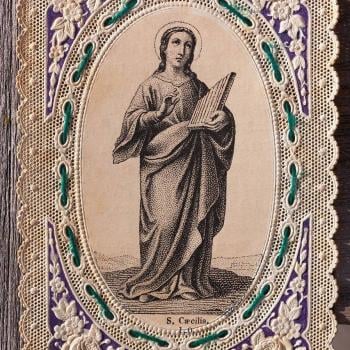Editor's Note: Below is a "Monday Sermon," from our series of sermons at the Patheos Preachers Portal that pastors can enjoy and learn from. It is our hope that this particular series from Daniel Harrell, which preaches through the Church Fathers, will encourage pastors, show them a way of approaching theological education from the pulpit, and refresh their theological memories. See Reverend Harrell's columnist page for more information.
You migraine sufferers out there know what it's like. The pounding and throbbing inside your brain that makes you feel like your head is going to explode any minute. The magnification of your senses to such an intensity that any light, noise, or smell becomes unbearable. The nausea. The blurred vision. The disorientation. The hallucination. The passionate creativity. Okay, so maybe that last one is less common. But for Hildegard of Bingen, this week's Church Mother starting with the letter H, migraines apparently fueled what for her was a life of ardent, spiritual output in service to God. Her visions, writing, musical composition, scientific pondering, spiritual direction—they all came accompanied by the classic symptoms of migraine sufferers. One of the earliest illustrations of Hildegard has her seated, tablet in hand, as fire streams from heaven and burns into her brain. Her admirers attribute God's grace with enabling this woman to bear so much remarkable fruit while bearing such debilitating headaches.
Twelfth-century Europe was a time of fervent faith as Christianity not only dominated the landscape but sought to extend its dominance into places where it had lost its grip, most notably the Middle East. The Crusades were in full, arrogant, and disastrous swing, encouraged by popes and bishops (who often bought their way into office) and executed by princes—all blinded by their aspirations of power, their prejudice, and the enticements of wealth. Into the materialistic and power-hungry fray, condemning the overreaching of the church and its marriage to the world, stepped Hildegard full of righteous condemnation she declared was derived straight from God.
"Faith wavers among the nations and the Gospel limps among the people," she wrote, speaking for God, "and the mighty books in which the church fathers had summed up knowledge with great care go unread from shameful apathy, and the food of life, which is the divine Scriptures, cools to tepidity. For this reason, I now speak through a person who is not eloquent in the Scriptures or taught by an earthly teacher; I Who Am speak through her of new secrets and mystical truths, heretofore hidden in books, like one who mixes clay and then shapes it to any form he wishes."
Hildegard was a mystic, one for whom an encounter with God takes on strong experiential and emotional hues. Mystics are reputed to have unmediated access to the "mysteries of Christ," those places where God alone is at work affecting the human soul and its relationship with him. Because of its emphasis on the subjective and its refusal to rely on human reason, mysticism (particularly in its medieval forms) has always had its critics. Nevertheless, it was Hildegard's passionate, head-throbbing, mysticism that energized her extraordinary boldness and ingenuity. "A fiery light, flashing intensely, came from the open vault of heaven and poured through my whole brain," she wrote. "Like a flame that is hot without burning, it kindled all my heart and all my breast. Suddenly I could understand [God's will for my life and his church.]"
Hildegard was justly famous all over Europe. She was a prodigious writer, playwright and poet, a composer, an annoyance as well as an advisor to kings and prelates, and a renowned healer of physical and mental ills. Her meditations and musical compositions have recently enjoyed a notable revival, which has proven to be a mixed blessing. Author Charlotte Allen describes how Hildegard has been re-invented as a posthumous spokeswoman for feminist causes and an icon of church rebellion. A prime example involves her best-known religious work, Scivias, or in English, Know the Way. The manuscript elaborates on Hildegard's many visions of Divine Wisdom, that eternal, upright, and prudent quality of divine existence that characterizes the faithful of God. For Hildegard, wisdom gives energy to all life, sustaining all things. Hildegard asserted that wisdom is manifest in the revelatory and redeeming knowledge of God, incarnate as Christ and vocal through the Scriptures. She is manifest finally in the redeemed church of God, the bride of Christ.





